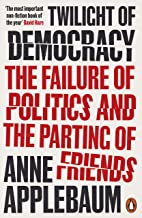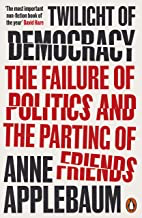Anne Applebaum: Twilight of Democracy: The Seductive Lure of Authoritarianism

By Walter Horn

Anne Applebaum, Twilight of Democracy: The Seductive Lure of Authoritarianism (Doubleday 2021)
There’s an (overused) internet meme from the movie Princess Bride , in which the character played by Mandy Patinkin looks with concern at the Wally Shawn character after one of the latter’s many repetitions of “It’s inconceivable!” and says, “You keep using that word; I do not think it means what you think it means.” That warhorse popped into my head frequently at Anne Applebaum’s use of “democracy” in her elegaic new book. For <em>The Twilight of Democracy</em>isn’t actually about democracy at all—or even really about authoritarianism--but is instead an (admittedly engrossing) hymn to the loss of status endured by a particular group of influential elites around the world since the night Applebaum appropriately took the passing of the last century as an opportunity to do precisely what the artist formally known as Prince suggested we all do.
That glorious New Year’s Eve was roughly when Applebaum and her husband Radosław Sikorski, , a long-time leading figure in center-right Polish and European Union politics, , last felt the kind of freedom and excitement one associates with being….special. As time passed after Applebaum’s party that night, the world seems to her to have gradually descended into to a much darker place, more parochial, bellicose and nationalistic, less dependably free market. It is has become, in her view, a world in which “clercs,” a class of professional pundits who have risen to high prominence in the world precisely because of their willingness to do the bidding of their populist masters by spinning truths into any sort of nonsense that might deceive a gullible public. Instead of the glittering city (on a hill, naturally) where corporate and journalistic elites might meet for afternoon drinks at an art museum benefit before strolling off to an evening concert by the Emerson String Quartet (or heading home to enjoy a 1950s Ealing comedy), the world has become a shady Gotham slum where both Corbyn-favoring lefties and rightwing Orbanites take powerful positions in government, leaving the safe-and-sound McCain-style centrists in their wake. Here, instead of Brahms, brie, and Alec Guinness, there are threatening sounds and unpleasant smells in the dirty streets, often emanating from disgruntled workers, homeless people, or minorities.
It would be one thing—unpleasant, but not culpability-creating--if the dramatic changes Applebaum docurmentws were wrought by the all-knowing invisible hand of the economy, but we are told that they have rather been intentional, mostly the result of political activity. While one might think in that case that the conversions could have been won fairly by those whose views just happen to be some distance away from those of the median voters Applebaum presumes share her views on the key issues. But the theory proposed here is that where this type of descent has occurred, the changes could only have grown from the worst sort of propagandistic lies, conspiracy theories and other forms of truth torturing and election stealing. For the valiant and true could never wish for anything but the world Applebaum misses, that of 1990s—or even better, the 1980s, when Ronald Reagan was in charge.
It is certainly clear to Applebaum that those who join her in believing that the Reagan Administration was the high-water mark of American democracy could never themselves have been guilty of, e.g., anti-Semitism, racism, or bellicose xenophobia. In her view, such sins have ever been found only on the left and on what she calls the “far right.” It seems to me disorienting to encounter any view entailing that such groups as the John Birch Society were not behind Reagan, but my perspective is obviously inconsistent with Applebaum’s belief that xenophobia, unfair discrimination, and press censorship has always been frowned upon among the cadre of Reagan, McCain and Macron supporters. I suppose the picture is that, since Reagan was the guy who told the communists to “Tear down that wall,” he must have been opposed to walls generally (except those between church and state and state and media).
Applebaum notes that the most powerful modern “clercs” are rightist, Tucker Carlson types rather than anyone now seen on CNN, but she is quick to point out that the rightwing she disapproves of “is a specific kind of right, one that has little in common with most of the political movements that have been so described since the Second World War. British Tories, American Republicans, East European Anti-Communists, German Christian Democrats, and French Gaullists” are, to her, the good guys. Those who should have been scorned by both the Left and Right are The Tea Party and its Trump-Le Pen-Bolsanaro-Orban successors. For they are the result of an unacceptable mutation of a large number of once glorious center-right parties and should be exiled to the penal colony where Stalin and Chavez have always belonged.
The main thesis of Applebaum’s book, then, is that, while she has always been a stalwart supporter of “representative democracy, religious tolerance, independent judiciaries, free press and speech, economic integration, international institutions, the transatlantic alliance, and a political idea of the West,” that has not been true of a considerable number of those who were her friends and compatriots in the 1980s and 90s. Those degenerates have abandoned the high ground they once shared with her—often for the crassest financial or power-seeking reasons—and have sought closer relations with the Satanic forces of either the left or the far right, where, allegedly, none of the above-listed republican virtues has ever been held in much esteem.
One might dig into the charges Applebaum levels against such former comrades as Laura Ingraham, Roger Scruton, Boris Johnson, and John O’Sullivan, consider the extent to which they have been fairly brought, and whether their accuser is herself beyond indictment. (And, in fact, an excellent recent review of that kind has been delivered by David Klion for <em>The Nation.</em>) My interests lie mostly elsewhere. I want to consider whether the admittedly sorry state of democracy around the world is a function of the sorts of attitudinal changes Applebaum has enumerated.
She tells us that [i]n modern Western democracies, the right to rule is granted, at least in theory, by different forms of competition: campaigning and voting, meritocratic tests that determine access to higher education and the civil service, free markets.” I take it from this that “rule” is here understood to mean not only what may legitimately be done by elected officials and their appointees but by the actions of such individuals who are or are akin to members of what in Britain is called the Home Civil Service: politically neutral bureaucrats, serving the Crown rather than Parliament, who are chosen by examinations. Hence, the “meritocratic tests” mentioned above. Perhaps the reference to “free markets” should be taken to mean that in modern Western democracies, having a lot of money has long been thought to entitle the bearers to public as well as private power: if not, I don’t know what that phrase is doing in there. In any event, when Applebaum says that in the West, “democratic competition” has for some time been seen as the “most just and efficient way to distribute power,” we can see that she thinks that democracy will be best (“most just and efficient”) where the power to rule is determined on the basis of “campaigns and voting,” educational credentials, and wealth.
If that is the correct, Reaganite way, Applebaum assures us it was certainly never the way of Lenin. Communist states did not put “competitive models” in place of the aristocratic orders they overthrew. Interestingly, Applebaum sometimes writes as though democracy can be separated out from the other sorts of competition she endorses when she says of one-party states that they are not merely undemocratic, but “also anticompetitive and antimeritocratic.” She also warns that under Bolshevism “places in universities, civil rights jobs, and roles in government and industry did not go to the most industrious or the most capable: they went to the most loyal.” I don’t know how many “civil rights” jobs there have ever been in any Bolshevist government, but surely one must agree with Applebaum that the goods in those countries have always been doled out on the basis of what has been best for the rulers. To a certain extent, however, that is true of all patronage. Regardless of the type of government, every head of state wants her appointees to make her look good—and loyalty is certainly one important ingredient in that stew. Being competent at other aspects of the job may also be useful, but is arguably less so than base servility.
In any case, Applebaum tells us that nepotism has been generally frowned on in the nations with government types that she favors, while being widely used in those systems she abhors, the countries where “crackpots and fools” commonly replace “first-rate talents.” She disapproves, for example, of changes in Poland and Hungary that have made it easier to “fire professionals and hire party hacks.” Of course, it will not be through majoritarian means that party hacks should be separated from professionals. This division would have to be accomplished either on the basis of some credentialing organization or by including considerations of financial success, for business acumen and wealth accumulation seem to her to be infallible judges of intrinsic talent—at least if the market is completely free. Her derision of those who are powerful or wealthy through any mechanism that is non-competitive mechanism in her sense is palpable. But it is clear that not even the best, purest democracy can actually count as an acceptable sort of competition for picking Applebaum’s brand of elites. For democracy is simply a way of getting the electorate who they want, whether those who are wanted are meritorious or not.
Thus, it is quite easy to see that it is not democracy that Applebaum fears is in decline. Rather, it is a combination of capitalistic and intellectual elitism that she worries has fallen into twilight. If majorities disagree with appropriate rankings of merit, they’re clearly wrong. Political scientists have told us that in the U.S., it has been the complete purification of the two major parties since the Vietnam War, in combination with exclusively first-past-the-post, single-member constituencies and such numerous non-majoritarian institutions as the Senate and the Electoral College that have combined to make politics intractably polarized here. But there is nothing in this book about any of those matters: it’s mostly a pastiche of pleas for things like a stronger EU and NATO and the return to power and prestige of the parties and policies that Applebaum and her husband support. Along with, of course, the evisceration of a bunch of former friends. Her book is much more a lament of glory lost than an analysis or history of democratic decline.
“Authoritarianism” is nowhere defined or otherwise explicated here, but it is known that it may come in democratic (e.g., Huey Long versions) as well as Putin-style forms. It is therefore hard to assess causation claims. We do know that in the Applebaum world, neither one-time Communist officials (who are likely to be “radically lonely conformists”) nor former Libertarians should ever be trusted: the former obviously received their prior posts as a result of a favoritism which must therefore form a deep part of their basic religion; the latter are apostates who must simply have figured out that they are second-raters who can’t cut it in a free market. It would seem then, that the only people Applebaum thinks ought to be trusted with the vote are either unwavering devotees of center-right politics or those who are eminently successful in the business world and so have passed all the tests imposed by the best measure of true merit. She warns us of the “resentment, revenge and envy” of those who have left her fold, and one wonders if she’d now be willing to exempt Ukraine’s current head of state from the scorn she aims at “ironic, parodic, and joke” political candidates who she complains are “suddenly winning elections.”
I have been harsh to this point, but I don’t want to give the impression that I don’t agree with anything in this book. Conspiracy theories (such as those detailed here involving George Soros) are indeed dangerous; anti-Semitism and other forms of racial and ethnic discrimination are reprehensible; freedom of speech, assembly and the press are essential to decency as well as to authentic democracy; we may expect dangerous lies where there are “dissatisfied, discontented intellectuals—people who feel that the rules aren’t fair and that the wrong people have influence.” I completely agree with her denial of any Brexiteer claim that there’s something pro-democracy about leaving the EU: supporters of a unified Europe are certainly not “enemies of the people.” She seems to me right that Orban has taken steps that ensure that there will no longer be anything like a fair election in Hungary as long as he is in power. Furthermore, I share her abhorrence of both Trumpism and Leninism.
The thing is, though, the essence of democracy is basically self-government: a plebiscitary arrangement requiring sincere attempts by governments to get the majority of the people what they want. And as Applebaum will not commit to such systems necessarily being good things, she should be seen to be no friend of democracy. Appropriate governmental electoral and administrative systems can guarantee neither the failure of Brexit nor the disappearance of the sort of nostalgia Applebaum disdains (or the ascendancy of her tonier, more globalist brand). Democracy is consistent with both radical wealth redistribution and government ownership of industry on one side and with almost no involvement in or regulation of the economy on the other. What it cannot abide, however, are ex ante, non-electoral determinations of how a nation should be run.

About the Author
Walter Horn is a philosopher of politics and epistemology.
His 3:16 interview is here.